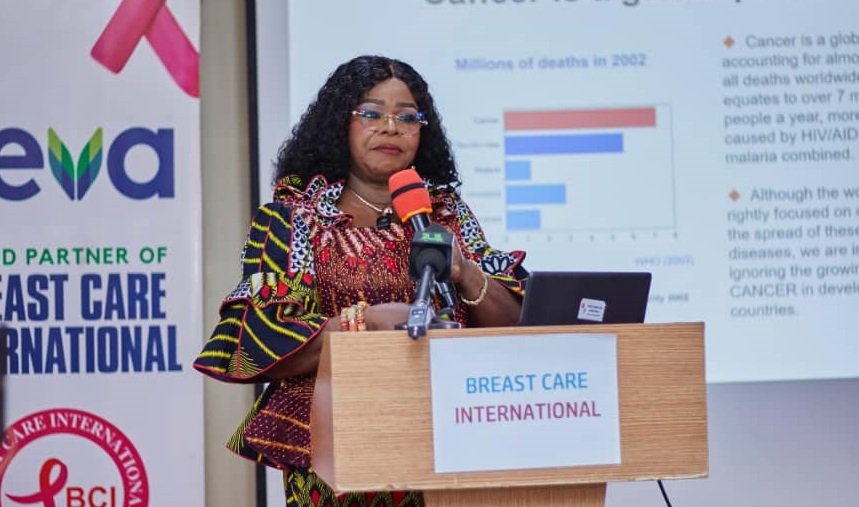News
Incorporate oncology education in nursing training – Dr Wiafe Addai

Dr Beatrice Wiafe Addai, Chief Executive Officer (CEO) of Breast Care International, has emphasised the pressing need to incorporate oncology education into standard nursing training to improve breast cancer care across Ghana.
“We are advocating a change of the curriculum of the nursing training schools in the country so that many oncology concerns can be added to their training schedules,” Dr Wiafe Addai stated.
She made the call during the opening of a two-day basic oncology training workshop at the Peace and Love Hospital in Kumasi for journalists, selected from the Eastern Region.
She emphasised a critical gap in Ghana’s healthcare education system – the absence of specialised oncology nursing training schools in the country.
“There are no oncology nursing training schools in the country,” Dr Wiafe Addai pointed out, “underscoring the significance of the curriculum reform,” she advocates.
She further explained that the curriculum reform would be essential alongside her organisation’s efforts to train healthcare professionals, particularly in underserved areas.
Dr Wiafe Addai highlighted that healthcare professionals in rural areas often served as the first point of contact for patients, making their education crucial for early detection and proper care.
One of the most disturbing revelations from the training was the social impact of breast cancer on patients’ lives as Dr Wiafe Addai noted that lack of proper counseling has resulted in many men divorcing their wives after diagnosis.
“The psychological impact of breast cancer extends far beyond the physical symptoms,” she elaborated. “Without adequate counseling for both patients and their families, women face abandonment at a time when they need support the most.”
Moreover, Dr Wiafe Addai stressed the importance of celebrating and highlighting cancer survivors. “Survivorship is most important as the more we have survivors, the more we see reduction of fear and stigma of the disease,” she emphasised.
She noted the fact that breast cancer does not start with pains was the reason many women live with the disease for a longer time before seeking for help.
The leading breast cancer advocate emphasised the need to dispel superstitious beliefs surrounding the disease. “It is not witchcraft that causes breast cancer,” she stated firmly, addressing a belief that still persists in some communities and often delays proper medical treatment.
She again highlighted the importance of involving younger generations in awareness campaigns. “It is very important to involve the youth in awareness creation of the disease,” noted Dr Wiafe Addai.
She also urged the public to know their family history regarding breast cancer, which can help with preventive measures.
Dr Kwabena Opoku-Adusei, former President of Ghana Medical Association, who chaired the function, encouraged journalists to use their platforms to spread accurate information about breast cancer, help reduce stigma, and promote early detection practices that could save countless lives.
Nana Osei Amankwa III, chief of Oduom, also asked journalists to eschew fake news because they are the mouthpiece of the people.
Ashanti and Eastern Regional Chairmen of the Ghana Journalists Association, Kingsley E. Hope and Maxwell Kudakor, used the occasion to urge journalists to be passionate about health related stories to combat misconceptions.
From Kingsley E. Hope, Kumasi
News
Prioritise affordable treatment of sickle cell treatment —Health Expert

Health experts have urged Ghana to prioritise affordable and accessible treatment for sickle cell disease (SCD) as advanced, but costly curative therapies remain out of reach.
SCD, an inherited blood disorder, affects about three in every 100 newborns in Ghana.
Globally, around 1,000 babies are born with the condition daily, with three-quarters in sub-Saharan Africa.
The disease causes severe complications including chronic pain, anaemia, infections, strokes and organ damage, often leading to shortened life expectancy.
In recent years, gene therapy has been developed as a potential cure.
However, its cost—running into millions of dollars per patient—makes it financially and technically inaccessible in Ghana.
According to Dr Lawrence Osei-Tutu, a Sickle Cell and Childhood Cancer Expert at the Komfo Anokye Teaching Hospital, “the country must instead focus on practical, lower-cost interventions such as hydroxyurea”, a decades-old cancer drug proven to reduce painful episodes, hospitalisation and life- threatening complications in SCD patients”.
Taken orally, the medicine improves red blood cell function and is considered safe and effective.
“Hydroxyurea therapy is as good as the cure and a low-hanging fruit to pluck, we must bring a cure to our sickle cell warriors, but do so sustainably.” he urged.
In a chat with The Spectator here, he said to create awareness on the disease, the expert noted that despite its benefits, “hydroxyurea is not widely accessible in Ghana.”
Stressing that, “many patients either cannot afford it or struggle with irregular supply through the health system.”
Moreover, he argued that scaling up access would provide immediate relief while the country builds the infrastructure, trains specialists and secures funding needed to support curative therapies in the future.
With an estimated 15,000 babies born with sickle cell disease annually in Ghana, Dr Osei Tutu cautioned that “failure to improve access to effective treatment will leave many patients vulnerable to preventable complications and early death.”
From Kingsley E. Hope, Kumasi
Join our WhatsApp Channel now!
https://whatsapp.com/channel/0029VbBElzjInlqHhl1aTU27
Hot!
Let’s reintroduce Cultural Studies to complement educational reforms — Tourism Minister

Madam Abla Dzifa Gomashie, the Minister of Tourism, Culture and Creative Arts, has emphasised the importance of reintroducing Cultural Studies in schools as part of Ghana’s broader educational reform agenda.
She said Cultural Studies would complement existing efforts to reposition Science, Technology, Engineering and Mathematics (STEM) and Technical Vocational Education and Training (TVET) to promote digital literacy and expand Creative Arts education.
Speaking at the 2025 Homowo Festival of the people of Ningo-Prampram, held on the theme: “Education: The Best Legacy for our Children,” Madam Gomashie said cultural education was critical to national identity and development.
She noted that the festival’s theme aligned with the Government’s vision to transform education in Ghana and encouraged the youth to embrace it not only as a means of personal development but also as a way of preserving traditional values.
These values, including patience, wisdom, and hard work, were at the core of the Homowo celebration, the Minister said.
“Cultural festivals like Homowo are vital instruments for strengthening cultural identity, preserving historical memory, and fostering national unity. Additionally, festivals serve as platforms for educating the youth through storytelling, music, dance, and other traditional practices, while also providing opportunities for community engagement.”
Madam Gomashie highlighted the strong foundation that Ghana’s tourism was built on, which included culture, traditions, and the creative industry, collectively contributing to over GH¢4.8 billion to the economy.
“Festivals give tourists reasons to visit our country. Therefore, with the right infrastructure and the development of all the domains, the sector can do more than what has been recorded,” she added.
Mr Sam Nartey George, the Member of Parliament for Ningo-Prampram and Minister of Communication, Digital Technology and Innovation, commended the community for their vibrant participation in the festival. He announced plans for the construction of a new nursing training school in Ningo, aimed at expanding access to healthcare education in the area.
Nene Osroagbo Djangmah XII, Paramount Chief of Great Ningo Traditional Area; King Dr Tackie Teiko Tsuru II, Ga Mantse; Nene Tetteh Wakah III, Paramount Chief of the Prampram Traditional Area; Prof. Odaifio Welentsi III, Paramount Chief of the Nungua Traditional Area; Naana Dugbakuwor Dugba II, Paramount Queen Mother of Great Ningo; and Mr. Elvis Afriyie Ankrah, Special Envoy on Religion and Inter-Faith Affairs, who represented the Chief of Staff, were among dignitaries at the festival. -GNA














